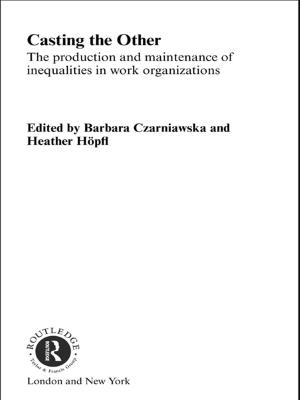| Author: | Roger Morriss | ISBN: | 9781351915588 |
| Publisher: | Taylor and Francis | Publication: | May 15, 2017 |
| Imprint: | Routledge | Language: | English |
| Author: | Roger Morriss |
| ISBN: | 9781351915588 |
| Publisher: | Taylor and Francis |
| Publication: | May 15, 2017 |
| Imprint: | Routledge |
| Language: | English |
Recent work on the growth of British naval power during the eighteenth and nineteenth centuries has emphasised developments in the political, constitutional and financial infrastructure of the British state. Naval Power and British Culture, 1760-1850 takes these considerations one step further, and examines the relationship of administrative culture within government bureaucracy to contemporary perceptions of efficiency in the period 1760-1850. By administrative culture is meant the ideas, attitudes, structures, practices and mores of public employees. Inevitably these changed over time and this shift is examined as the naval departments passed through times of crisis and peace. Focusing on the transition in the culture of government employees in the naval establishments in London - in the Navy and Victualling Offices - as well as the victualling yard towns along the Thames and Medway, Naval Power and British Culture, 1760-1850 concerns itself with attitudes at all levels of the organisation. Yet it is concerned above all with those whose views and conduct are seldom reported, the clerks, artificers, secretaries and commissioners; those employees of government who lived in local communities and took their work experience back home with them. As such, this book illuminates not only the employees of government, but also the society which surrounded and impinged upon naval establishments, and the reciprocal nature of their attitudes and influences.
Recent work on the growth of British naval power during the eighteenth and nineteenth centuries has emphasised developments in the political, constitutional and financial infrastructure of the British state. Naval Power and British Culture, 1760-1850 takes these considerations one step further, and examines the relationship of administrative culture within government bureaucracy to contemporary perceptions of efficiency in the period 1760-1850. By administrative culture is meant the ideas, attitudes, structures, practices and mores of public employees. Inevitably these changed over time and this shift is examined as the naval departments passed through times of crisis and peace. Focusing on the transition in the culture of government employees in the naval establishments in London - in the Navy and Victualling Offices - as well as the victualling yard towns along the Thames and Medway, Naval Power and British Culture, 1760-1850 concerns itself with attitudes at all levels of the organisation. Yet it is concerned above all with those whose views and conduct are seldom reported, the clerks, artificers, secretaries and commissioners; those employees of government who lived in local communities and took their work experience back home with them. As such, this book illuminates not only the employees of government, but also the society which surrounded and impinged upon naval establishments, and the reciprocal nature of their attitudes and influences.















